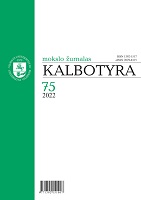Intensivierer und epistemische Adverbiale – Zur Geschichte von echt
Intensifiers and epistemic adverbials – On the history of German echt ‘really, lit. real/genuine’
Author(s): Bjarne ØrsnesSubject(s): Epistemology, Morphology, Semantics, Historical Linguistics, Philosophy of Language
Published by: Vilniaus Universiteto Leidykla
Keywords: Intensifier; epistemic adverbials; reanalysis; grammaticalisation;
Summary/Abstract: Adverbials of truth or reality such as really (en.), wirklich (de.), verdaderamente (sp.) are cross-linguistically assumed to be a rich source for intensifiers (degree words) as in: (i) Peter is really nice. The epistemic adverbial is reanalysed as a modifier of a predicative adjective in a syntactically ambiguous sentence as in (i). At the same time the emphasis on the truth of the proposition invites the inference that the property in question is amply present. This view on the emergence of intensifiers from adverbials of truth is challenged by the German intensifier echt ‘really, lit. genuine/real’ as in: (ii) Peter ist echt nett ‘Peter is really nice’. In contemporary German echt is very popular as an intensifier, a proposition modifier, a speech-act modifier and a response particle. However, a diachronic analysis of the use of echt as an adverbial in New High German reveals that the intensifier reading develops much earlier than the reading as a proposition modifier, i.e. an epistemic adverbial. The article offers a discussion of the development of echt which sheds a somewhat different light on the relation between intensifiers and epistemic adverbials, and it suggests a unified analysis of the uses of echt in contemporary German which supports Traugott’s view of grammaticalisation as also encompassing an extension of structural scope.
Journal: Kalbotyra
- Issue Year: 2022
- Issue No: 75
- Page Range: 107-132
- Page Count: 26
- Language: German

